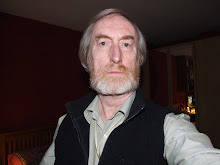I was already up in Covent Garden for the start of this journey, so it was largely a case of trying to prevent it turning into a pub crawl. I managed this by rushing straight to the Charing Cross train and pretending I was going home: till I got to London Bridge. London Bridge is full of 'snacky' places. I settled for a traditional pasty from the Pasty wagon. So I wasn't beering on a completely empty stomach. It's just about possible to behave properly with a couple of pints on board, but any more and I feel more part of the play than is proper. (Query: is that why some audiences misbehave so badly?) So I could then settle in at the Shipwrights Arms till the companion turned up. Which she did, with the usual five minutes to spare.
It is quite challenging to call 'Ethics of Progress' a play, but that is what I am determined to do: if it's in a theatre, with theatre staging, and actors playing a pre-arranged script, it's a play: OK! This play was about Particle Physics (I think). An appropriate choice for a week in which the Large Hadron Collider was commissioned. I've got this joke about the LHC. I ask you if you know what a Hadron is, 'cos it's a pretty safe bet you don't. I do because I looked it up, special. So you say "no, I don't" and I say "it's a collection of quarks: do you know what a quark is?" and you say, catching on to the litany, "no I don't", and I say (and this, I'm afraid, is the punch line) "don't worry, neither does anybody else!". Needs a bit of work, would you say? Anyway, 'Ethics of Progress' was about a particle. Or maybe it was about two particles. I once got off a train with a mathematician. (This is a true story.) At the end of the platform, a notice said "Passengers should leave by both exits" Being more wedded to the physical world, I thought that impossible: "How are we going to do that?", I asked him. Without a moments hesitation, he said "We'll just go through one of them with a probability of a half". So let's settle on the play being about two particles with a probability of a half.
The play is a monologue. The single character amused us by attempting to explain how something could be in two places at once, using splendid visual aids, as they're called in the ed biz. The explanation involved a lot of that hilarious science journalism which pretends that we can visualise complex multi-dimensional objects. You know the sort of thing: if you run round the universe fast enough you will eventually have the opportunity, if you so chose, to vanish up your own bottom. The journalist usually cites Einstein as a verifier of this possibility, at which point, you think "but Einstein was dead clever, wasn't he, so he couldn't possibly think that". Einstein probably thought something involving a lot of equations with multiplicities of terms with multiplicities of dimensions. But had he concluded that this meant he could vanish up his own bottom, he would, ipso facto, have concluded this must be wrong.
Then there were 'black holes': how can you fall into a hole? Surely you would fall through a hole? Would it not be better if they called it a black 'pot'? Or would that risk it calling them a black kettle?
And teleportation: based on a concept physicists call 'entanglement'. There was a very well-crafted play on Radio 4 (last year, I think) about that very subject. Basically it involved murder as an intrinsic part of the process. The ethics of murder were not raised.
'Ethics of Progress' was very enjoyable, very slickly staged, and the actor carried his role with great conviction. It was all very seminal and very enjoyable. But I, at least, failed to grasp where the 'ethics' came into it.
I have to end on a bit of a sour note. "After the interval", we were told," there would be a 'question and answer' session". Now, as you know, I have quite strong views about the role of the audience in theatre. And it doesn't involve taking part. Even in pantomime the audience has only a limited, scripted, and (vitally) a corporate role to play. So I was having none of my illusions damaged by jumping into the play. The companion confessed that she rather fancied an early night, so 'ethics' went straight out the window. We raced home, her on her motorbike, me in my train. But I wasn't leaving at the interval: the play had ended.

No comments:
Post a Comment